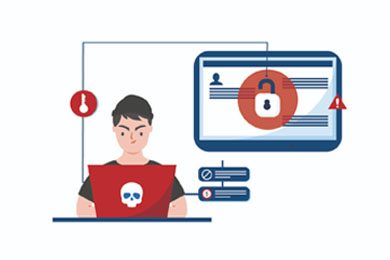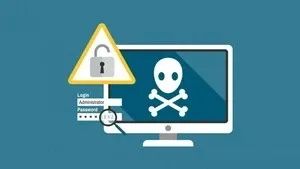This plan includes
- Limited free courses access
- Play & Pause Course Videos
- Video Recorded Lectures
- Learn on Mobile/PC/Tablet
- Quizzes and Real Projects
- Lifetime Course Certificate
- Email & Chat Support
What you'll learn?
- How To Become An Elite Ethical Hacker
- How To Setup A Hacking Lab
- How To Launch Attacks/Exploits Against Computers
- How To Start A Cybersecurity/Ethical Hacking Career
- How To Hack Into Wireless Networks
- How To Conduct Penetration Tests
- How To Bypass Antivirus
Course Overview
Welcome to - Learn Ethical Hacking From A-Z: Beginner To Expert Course!
This practical, hands-on course was created for newbies – that's to say, people with no prior training or knowledge in hacking and cybersecurity. The aim of this course is to give you the education not just to understand what black-hat hatters do and how, but also to learn exactly how to hack systems like a pro and win the cat and mouse game by securing systems like a professional security expert.
Blending practical work with solid theoretical training, we take you from the basics of ethical hacking through to mastery, giving you the training you need not just to hack, but also to secure against a hack.
While the theory is important, we understand that it can also be dry and uninspiring. For this reason, this course is packed with examples that you can follow. This practical focus starts from the beginning, where we will teach you about penetration testing and show you how to install the software required (Windows, Linux, and Mac OSX) and jump right into hacking.
Throughout, you will analyze and exploit various systems from regular websites through to sprawling networks, along with hacking servers and clients. More than just hacking, you'll also learn how to conduct efficient penetration testing techniques.
This approach gives you the foundational education that you need not just to hack any given system, but also to secure it, with each module covering both sides of the coin. The course covers six main areas:
1: LEARN THE FUNDAMENTALS NECESSARY TO BECOME A HACKER
This foundational section gives you a full introduction to the basics of networking systems – how they communicate and work – and is designed to give you the knowledge you need to succeed in this course.
- BASICS OF NETWORKING: Networking can be an intimidating topic, but don’t worry! We break down only the necessary things that you need to know in regards to networking and teach you important networking fundamentals
- SETTING UP A HACKING LAB: You can’t hack without a lab! We walk you step-by-step through the process of setting up your own hacking lab on your laptop or desktop computer!
- LINUX + SCRIPTING BASICS: Hackers use Linux, which is an OS that the average person may have no experience with. We will go over Linux fundamentals so that you can easily navigate your way through Linux during this course. We also touch on a couple of scripting languages that are a MUST for any ethical hacker and teach you the basics of each one with practical examples.
- HIDING YOUR IDENTITY ON THE WEB: If you are hacking on the internet, you need to learn how to remain anonymous. We will show you the tools and techniques that you can use to always remain anonymous and unknown on the internet.
2: LEARN HOW TO HACK NETWORKS
This section shows you how to test both wired and wireless systems. You will learn how to go from not having any access to a network to gaining access and being able to begin attacking systems on the network.
- PRE-CONNECTION ATTACK: Not all attacks require you to be connected to the target or even know the password. Learn how to discover and manipulate devices connected to a network and gather information about your target
- GAIN ACCESS TO NETWORKS: Learn how to use the information you have about your target to crack the key and get the access password. This section covers multiple protocols including WEP, WPA, and WPA2
- POST-CONNECTION ATTACKS: With a key, you can now leverage powerful hacking techniques to get even more information. Learn how to see what users are doing on a network, inject code in pages, and more on wired and wireless networks
3: HOW TO GAIN ACCESS AND CONNECT TO NETWORKS
This section builds on the lessons learned in section one, showing you how you can get full control and hack into any computer system that you target.
- SERVER-SIDE ATTACK: Discover how to harvest information about your targeted system – its OS, open ports, and installed services – without user interaction. Then use this information to exploit vulnerabilities and generate reports
- CLIENT-SIDE ATTACK: Learn how to hack systems with no vulnerabilities by sneaking in with software updates or using backdoor trojan downloads. You’ll also learn the art of social engineering – or tricking people into giving you information
4: HOW TO LEVERAGE POST EXPLOITATION
This section shifts the focus on interacting with compromised systems. Now that you have gained access, you'll learn how you can exploit these systems.
- ACCESS FILE SYSTEMS: All systems have a wealth of files that you can now manipulate with your access. Learn how to access these systems and how to read, write, upload, and even execute files
- MAINTAIN ACCESS: Gaining access to a system and its files is only half of the battle. Learn how to maintain your access and frustrate efforts to secure it again so you can continue to exploit a system
- SPY ON YOUR TARGET: Learn how to capture any keystrokes on a keyboard, turn on a computer webcam, take screenshots, and even take control of the system to attack, hack, and access third-party networks and systems
5: HOW TO HACK WEBSITES AND WEB APPS
In this section, you will learn more about how you can hack into websites and web applications using Kali Linux. You’ll also learn how web applications work – and how to find vulnerabilities within these applications for you to exploit.
- How to scan websites/web applications for vulnerabilities to exploit
- How to Brute Force into web applications
- How to conduct SQL injection in web applications
- How to conduct Cross Site Request Forgery (CSRF)
- How to exploit File Inclusion Vulnerabilities
- How to exploit File Upload Vulnerabilities
- How to automate attacking web applications using various tools
- How to prevent and secure websites & apps yourself
6: HOW TO MAKE MONEY, LAND A JOB & BUILD A BRAND AS A HACKER
In this section, you will learn how you can make money as an ethical hacker using a variety of methods. You’ll also learn how to build your personal brand and get your name out there as an Ethical Hacker so you can have employers and clients knocking at your door ready to hire you for your services. Then finally, you’ll learn how you can start a career in cybersecurity with some insider tips on what certifications to get and the best way to land a job.
This includes:
- How to build an ethical hacker personal brand from scratch
- How to get instant credibility and authority as a hacker
- How to properly network and get others talking about you
- How to make money using a variety of websites
- How to get started freelancing as a hacker
- How to get started consulting as a hacker
- How to land a job as a cybersecurity professional
This course is comprehensive, showing you both sides of hacking. You will learn to think and operate like a hacker – and how to apply that knowledge as a cybersecurity expert to protect you and your clients' networks and systems. In taking this 'cat and mouse' approach, your rounded understanding will give your approach new depths and angles, revealing the paths you can take to effectively neutralize any threat.
Together with the emphasis on practical examples that you can follow in real life with live systems, you will also benefit from the excitement of hands-on learning. By experiencing precisely what it takes to hack into any given target system, you'll also learn that no one system is the same and that all approaches can be modified.
This real-life learning is an invaluable part of your education, enabling you to better see what hackers are doing and how to block even the most potent attacks. No matter what the scenario or how complicated a hacking situation, this course gives you the foundational training you need to secure a network – and start pursuing a career in a field that is increasingly in demand as the global reliance on technology grows.
Pre-requisites
- Basic computer skills are needed.
- Linux
Target Audience
- No prior experience is required.
Curriculum 102 Lectures 11:45:48
Section 1 : Course Introduction
- Lecture 2 :
- About Your Instructors
- Lecture 3 :
- Section Overview
- Lecture 4 :
- Current Cybersecurity Market
- Lecture 5 :
- The 3 Types of Hackers
- Lecture 6 :
- The 4 Elements of Security
- Lecture 7 :
- Ethical Hacking Terminology
- Lecture 8 :
- Common Methods of Hacking
- Lecture 9 :
- Cyber Security _ Ethical Hacking Overview
- Lecture 10 :
- Ethical Hacking vs Pentration Testing
- Lecture 11 :
- Jobs Opportunities in Cybersecurity
- Lecture 12 :
- Who_s This Course For
Section 2 : Networking Basics
- Lecture 1 :
- 1. Networking Section Overview
- Lecture 2 :
- 2. How Data Travels Across The Internet
- Lecture 3 :
- 3. Understanding Ports and Protocols
- Lecture 4 :
- 4. Public _ Private IP_s Overview
- Lecture 5 :
- 5. What Are Subnets
- Lecture 6 :
- 6. The Average Network vs Remote Based
Section 3 : Setting Up Your Hacking Lab
- Lecture 1 :
- 1. Hacking Lab Section Overview
- Lecture 2 :
- 2. Understanding Virtual Machines
- Lecture 3 :
- 3. Setup Your Kali Linux Machine
- Lecture 4 :
- 4. VN Setup _ Testing Vulnerable Systems
Section 4 : 4. Linux+Python+Bash+Powershell Basics
- Lecture 1 :
- 1. Linux+Python+Bash+Powershell Basics Overview
- Lecture 2 :
- 2. Linux Basics
- Lecture 3 :
- 3. Working With Directories _ Moving Files
- Lecture 4 :
- 4. Installing _ Updating App Files
- Lecture 5 :
- 5. Linux Text Editors
- Lecture 6 :
- 6. Searching For Files
- Lecture 7 :
- 7. Bash Scripting
- Lecture 8 :
- 8. Python Basics
Section 5 : 5. How To Remain Anonymous On The Web
- Lecture 1 :
- 1. Remaining Anonymous Section Overview
- Lecture 2 :
- 2. TOR Browser Overview
- Lecture 3 :
- 3. Anonsurf Overview
- Lecture 4 :
- 4. Changing Mac Addresses
- Lecture 5 :
- 5. Using a Virtual Private Network _ Server (VPN, VPS)
Section 6 : 6. How To Hack WiFi
- Lecture 1 :
- 1. WiFi Hacking Section Overview
- Lecture 2 :
- 2. Wifi Hacking System Setup
- Lecture 3 :
- 3. WEP Hacking Attack #1
- Lecture 4 :
- 4. WEP Hacking Attack #2
- Lecture 5 :
- 5. WPA _ WPA2 Hacking
Section 7 : Passive _ Active Reconnaissance
- Lecture 1 :
- 1. Reconnaissance Section Overview
- Lecture 2 :
- 2. Passive + Active Recon
- Lecture 3 :
- 3. Recon-ng Overview
- Lecture 4 :
- 4. Whois Enum
- Lecture 5 :
- 5. DNS Enumeration Overview
- Lecture 6 :
- 6. Netcraft DNS Information
- Lecture 7 :
- 7. Google Hacking Overview
- Lecture 8 :
- 8. Shodan.io Overview
- Lecture 9 :
- 9. Securityheaders.com (Analyze HTTPS Headers of website)
- Lecture 10 :
- 10. Ssllabs.comssltest (Look for SSL issues on website)
- Lecture 11 :
- 11. Pastebin.com (Sensitive Information)
- Lecture 12 :
- 12. NMAP Port Scanning (Discover open ports, OS, Services,
- Lecture 13 :
- 13. Netcat Overview + SMB _ NFS Enumeration
- Lecture 14 :
- 14. Nikto _ Sparta Web Application Scanner
- Lecture 15 :
- 15. SMPT Enumeration + Nessus +Openvas Scanners
Section 8 : 8. Launching Attacks
- Lecture 1 :
- 1. Launching Attacks Overview
- Lecture 2 :
- 2. Analyzing Information Gathered
- Lecture 3 :
- 3. Taking Advantage of Telenet
- Lecture 4 :
- 4. Searching _ Understanding Exploits
- Lecture 5 :
- 5. Copy Exploits From Searchsploit
- Lecture 6 :
- 6. Understanding Exploits
- Lecture 7 :
- 7. Launching Exploits
- Lecture 8 :
- 8. Brute Force Attacks
- Lecture 9 :
- 9. How To Crack Passwords
- Lecture 10 :
- 10. ARP Spoofing Overview
- Lecture 11 :
- 11. Introduction To Cryptography
Section 9 : 9. Post Exploitation
- Lecture 1 :
- 1. Post Exploitation Section Overview
- Lecture 2 :
- 2. Privledge Escalation
- Lecture 3 :
- 3. Transferring Files Within Victim, Creating Custom Malware +Evading AV
- Lecture 4 :
- 4. Installing a Keylogger
- Lecture 5 :
- 5. Installing a Backdoor
Section 10 : 10. Website _ Web Application Hacking
- Lecture 1 :
- 1. Website _ Web App Hacking Overview
- Lecture 2 :
- 3. Directory Buster Hacking Tool
- Lecture 3 :
- 4. Nikto Web App Hacking Tool
- Lecture 4 :
- 5. SQLmap and SQL Ninja Overview
- Lecture 5 :
- 6. How To Execute Brute Force Attacks
- Lecture 6 :
- 7. Using Command Injection
- Lecture 7 :
- 8. Malicious File Uploads
- Lecture 8 :
- 9. Local _ Remote File Inclusion
- Lecture 9 :
- 10. SQL Injection
- Lecture 10 :
- 11. Using Cross Site Forgery
- Lecture 11 :
- 12. Cross Site Scripting Overview
Section 11 : 11. Mobile Phone Hacking _ Security
- Lecture 1 :
- 1. Mobile Phone Hacking Section Overview
- Lecture 2 :
- 2. Mobile Attack Vectors
- Lecture 3 :
- 3. Mobile Hacking with URL_s
- Lecture 4 :
- 4. Jail Breaking and Rooting Considerations
- Lecture 5 :
- 5. Privacy Issues (Geo Location)
- Lecture 6 :
- 6. Mobile Phone Data Security
Section 12 : 12. Getting Your Name Out There As A Hacker
- Lecture 1 :
- 1. Getting Your Name Out There Section Overview
- Lecture 2 :
- 2. Building A Brand
- Lecture 3 :
- 3. Personal Branding
- Lecture 4 :
- 4. Setup Your Website and Blog
- Lecture 5 :
- 5. Writing a Book
- Lecture 6 :
- 6. Starting a Podcast
- Lecture 7 :
- 7. Networking Overview
Section 13 : 13. How To Make Money As An Ethical Hacker
- Lecture 1 :
- 1. Making Money Section Overview
- Lecture 2 :
- 2. Bug Bounty Programs
- Lecture 3 :
- 3. How To Start Freelancing
- Lecture 4 :
- 4. How To Start Client Consulting
Section 14 : 14. How To Start a Career In Cybersecurity
- Lecture 1 :
- 1. Potential Salary _ Cybersecurity Roadmap
- Lecture 2 :
- 2. Book Recomendations
- Lecture 3 :
- 3. Places to Practice Hacking for Free
Our learners work at
Frequently Asked Questions
How do i access the course after purchase?
It's simple. When you sign up, you'll immediately have unlimited viewing of thousands of expert courses, paths to guide your learning, tools to measure your skills and hands-on resources like exercise files. There’s no limit on what you can learn and you can cancel at any time.Are these video based online self-learning courses?
Yes. All of the courses comes with online video based lectures created by certified instructors. Instructors have crafted these courses with a blend of high quality interactive videos, lectures, quizzes & real world projects to give you an indepth knowledge about the topic.Can i play & pause the course as per my convenience?
Yes absolutely & thats one of the advantage of self-paced courses. You can anytime pause or resume the course & come back & forth from one lecture to another lecture, play the videos mulitple times & so on.How do i contact the instructor for any doubts or questions?
Most of these courses have general questions & answers already covered within the course lectures. However, if you need any further help from the instructor, you can use the inbuilt Chat with Instructor option to send a message to an instructor & they will reply you within 24 hours. You can ask as many questions as you want.Do i need a pc to access the course or can i do it on mobile & tablet as well?
Brilliant question? Isn't it? You can access the courses on any device like PC, Mobile, Tablet & even on a smart tv. For mobile & a tablet you can download the Learnfly android or an iOS app. If mobile app is not available in your country, you can access the course directly by visting our website, its fully mobile friendly.Do i get any certificate for the courses?
Yes. Once you complete any course on our platform along with provided assessments by the instructor, you will be eligble to get certificate of course completion.
For how long can i access my course on the platform?
You require an active subscription to access courses on our platform. If your subscription is active, you can access any course on our platform with no restrictions.Is there any free trial?
Currently, we do not offer any free trial.Can i cancel anytime?
Yes, you can cancel your subscription at any time. Your subscription will auto-renew until you cancel, but why would you want to?
Instructor

692316 Course Views
16 Courses



 Tech & IT
Tech & IT
 Business
Business
 Coding & Developer
Coding & Developer
 Finance & Accounting
Finance & Accounting
 Academics
Academics
 Office Applications
Office Applications
 Art & Design
Art & Design
 Marketing
Marketing
 Health & Wellness
Health & Wellness
 Sounds & Music
Sounds & Music
 Lifestyle
Lifestyle
 Photography
Photography


























